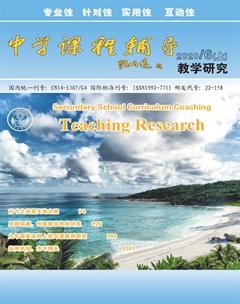短文改错之若干“症状”及“药方”
陶启贵
摘要:短文改错是高考题中的必考题型,所涉及知识很基础,但很多学生得分较低。主要原因是他们不知解题方法,没有掌握好解题技巧。本文就短文改错常见“症状”及“药方”提出自己的一些看法,希望对学生有所帮助。
关键词:高考;短文改错;常见“症状”及“药方”
中图分类号:G632.0文献标识码:A文章编号:1992-7711(2020)06-0169
短文改错是高考题中对学生基础知识进行考查的一种题型,所涉及知识很基础,但学生往往在此题失分较多。其实做好短文改错并不难,只要我们能像大夫一样,了解常见“症状”,就能“对症下药”。只要我们在学习中认真积累、反思,在做题时明察秋毫,我们就可拥有一双慧眼。以下列举一些常见错误及应对策略,供参考。
症状一:冠词使用错误
药方:该症状一般为误用a和an(根据单词的第一个因素判断),以及冠词搭配错误。
1. (2018全国卷Ⅰ)During my last winter holiday,I went to countryside with my father to visit my gandparents.
此处countryside特指祖父母所住的农村,其前须加定冠词the.
2. Yesterday afternoon I paid visit to Mr Johnson.
pay a visit to为固定搭配,应在visit前加a。
3. (2019全国卷III)Each of my cafes will have a different theme and an unique style.
an→a. unique首字母u为元音字母,非元音音素。
症状二:名词及所有格使用错误
药方:此症状常表现为名词单复数错用,以及可数名词和不可数名词错用。
1. Paul,only five year old,hid and locked himself in a storage mailbox by accident.
此处five year应为复数,改year为years.
2. She said that she and my schoolmate all wished me success.
根据句意分析,schoolmate应改为复数形式schoolmates.
3. (2019全国卷III)I wish to have a chain of cafes in many different city.
Many different后应用city的复数形式cities.
症状三:短语及常见句型搭配错误
药方:要求学生在平时学习中注意对语言基本现象和基本规律的积累。如,do wrong→go wrong,on particular→in particular. neither... or...→neither...nor...,for a result→as a result,share for→share with,suffer by→suffer from等。还有一些固定结构的误用,如,so...that被误用作very...that,too...to被误用very...to,as...as被误作so...as等。
1. Ive suffered by back pain for years.
2. Every day,he spend too much time with his work.
3. (2019全国卷Ⅱ)They were two reasons for the decision.
上述1中suffer from为固定搭配,应将by改为from. 2中with改为on. 3中考查固定句式,此句为存在句,故用there be句型,将They改为There.
症状四:时态、语态和语气错误
药方:时态、语态和语气错误是历年考查的热点。多数动词有时态、语态和语气变化形式,还有上下文或主从句的时态对应等特点。有时看一篇文章,要看上下文的时态是否一致。
1. Quietly,I step into the room.I saw him lying in bed,looking at some of the pictures we had taken together.
此句明显描述的是过去的动作。从saw及had taken等处可以知道,应将step改为stepped.
2. (2018全国卷Ⅱ)I didnt realize how right my parents are until I entered high school.
根据上下文的时态呼应,应改are为were.
症状五:形容词和副词用错
药方:形容词一般在句中作定语修饰名词或代词,作表语说明主语的特征;系动词(be/become/go等)和感官动词(smell/feel等)后用形容词。而副词的作用较复杂,常修饰形容词、副词、介词短语、动词。有些词用法易混,如exciting与excited,hard与hardly,possible与possibly,here与there等,以及形容词与副词的比较级与最高级的用法等。
1. The first man got over his shock and polite said to the angel.
2. (2019全國卷Ⅱ)First,I wanted to be a fireman,whose uniform looked so coolly.
1中polite处应为副词修饰行为动词,应将polite改为politely.2中look是系动词,意为“看起来”,后面应用形容词cool作表语。
症状六:从属连词----各种从句的引导词错误
药方:要能熟练掌握各类从句的特点,用法,引导词等。一般具有较高的区分度。
1. I live in Beijing,where is the capital of China.
此句后一部分是非限制性定语从句,应用关系代词which作主语。
2. (2018全国卷Ⅰ)They also had a small pond which they raised fish.
先行词pond在定语从句中作状语,指养鱼的地方,故须用关系副词where或“介词in+which”来引导这个定语从句。
症状七:并列连词使用错误
药方:应根据上下文,分清并列连词的种类,看是否正确。
经常出错的地方是:and,but,or,so等之间的混用;because与so并用;although与but并用;why与because并用。
1. (2014全国卷Ⅰ)Although we allow tomato plants to grow in the same place year after year,but we have never had any disease or insect attack problems.
2. (2019全国卷Ⅰ)Suddenly a football fell just in front of me but almost hit me.
1句去掉but或but→yet.2句“足球落到我面前”与“几乎砸到我”之间是并列关系,故将but改为and来连接。
(作者单位:四川省广元中学628017)

